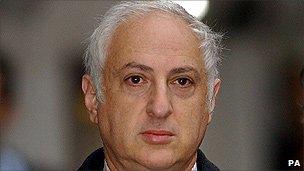Terror watchdog says UK is 'safe haven' for suspects
- Published

Control orders are best for monitoring some suspects, says Lord Carlile.
The UK has become a "safe haven" for foreign suspects, the outgoing terror laws watchdog has said.
In his last report, Lord Carlile said rulings from the European Court of Human Rights meant it was difficult to remove dangerous people.
He said the UK was relying on foreign states' assurances about the treatment of suspects that judges may not accept.
He also said the political debate over replacing control orders had been "poorly informed" at times.
In his sixth annual report, Lord Carlile, a QC and Liberal Democrat peer, said that the UK had failed to persuade the European Court that the risk of ill-treatment faced by a detainee in his home country had to be balanced with the threat posed to the UK's national security.
The UK had deals over the treatment of deportees with Algeria, Jordan, Ethiopia and Libya - but Lord Carlile said the legal chances of avoiding removal remained high.
"The effect is to make the UK a safe haven for some individuals whose determination is to damage the UK and its citizens, hardly a satisfactory situation," he said.
"I support the proposals in the counter-terrorism review that the government should pursue deportation arrangements with more countries. I support very strongly efforts to pursue verifiable assurances for named individuals, in relation to countries with which there is no generic agreement.
"In addition, I suggest that my successor should be commissioned to provide an annual independent report on deportations in terrorism cases, and the monitoring/verification of their situation after deportation."
Protection from torture
However, Immigration Minister Damian Green said he thought Lord Carlile had overstated the case.
He told BBC One's Question Time: "I take what he says seriously because he's been doing that job for a number of years.
"I think it is over-vivid language. It's clearly language designed to grab a headline and cause a debate."
Mr Green said there was a balance to be struck between allowing people freedoms and protecting them from "evil people".
Human rights campaign group Amnesty International said Lord Carlile's suggestion of a "safe haven" was "outrageous".
The charity's UK director, Kate Allen, said: "The global ban on deporting people to countries where they're at risk of torture exists for a very good reason - to protect us all from the threat of being tortured."
She said: "Signing unenforceable 'diplomatic assurances' with countries known to use torture already undermines the international ban on this abhorrent practice.
"The UK should be supporting global efforts to eradicate torture, not trying to get round international law."
'Political steam'
Lord Carlile said that control orders remained the best means of monitoring suspects who could be neither deported nor tried for an offence.
But he called for a formal security services-approved system of briefing opposition figures, which could take some of the "political steam" out of the "poorly informed debate" over the proposed replacement for the current system.
"The manifestos of the [coalition] political parties then in opposition were written without detailed knowledge of the evidence base for control orders, generally and in relation to individuals," he said.
"In my view this is regrettable, and should be remedied in the present system and any legislative replacement.
"I recommend that one or two senior spokespersons for at least the official opposition should be… vetted: the purpose of this would be that, whilst respecting confidentiality and national security, they should be able to give informed advice to their shadow colleagues on the merits of the legislation."
The coalition has pledged to replace control orders with a new regime called Terrorism Prevention and Investigation Measures.
- Published26 January 2011
- Published26 January 2011
- Published3 January 2011